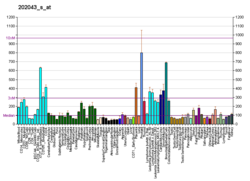| SMS | |||||||||||||||||||||||||||||||||||||||||||||||||||
|---|---|---|---|---|---|---|---|---|---|---|---|---|---|---|---|---|---|---|---|---|---|---|---|---|---|---|---|---|---|---|---|---|---|---|---|---|---|---|---|---|---|---|---|---|---|---|---|---|---|---|---|
 | |||||||||||||||||||||||||||||||||||||||||||||||||||
| |||||||||||||||||||||||||||||||||||||||||||||||||||
| Identifiers | |||||||||||||||||||||||||||||||||||||||||||||||||||
| Aliases | SMS, MRSR, SPMSY, SRS, SpS, spermine synthase, MRXSSR | ||||||||||||||||||||||||||||||||||||||||||||||||||
| External IDs | OMIM: 300105; MGI: 3705601; HomoloGene: 88709; GeneCards: SMS; OMA:SMS - orthologs | ||||||||||||||||||||||||||||||||||||||||||||||||||
| |||||||||||||||||||||||||||||||||||||||||||||||||||
| |||||||||||||||||||||||||||||||||||||||||||||||||||
| |||||||||||||||||||||||||||||||||||||||||||||||||||
| |||||||||||||||||||||||||||||||||||||||||||||||||||
| Wikidata | |||||||||||||||||||||||||||||||||||||||||||||||||||
| |||||||||||||||||||||||||||||||||||||||||||||||||||
Spermine synthase is an enzyme that in humans is encoded by the SMS gene. The protein encoded by this gene belongs to the spermidine/spermine synthases family. This gene encodes a ubiquitous enzyme of polyamine metabolism.
References
- ^ GRCh38: Ensembl release 89: ENSG00000102172 – Ensembl, May 2017
- "Human PubMed Reference:". National Center for Biotechnology Information, U.S. National Library of Medicine.
- "Mouse PubMed Reference:". National Center for Biotechnology Information, U.S. National Library of Medicine.
- Korhonen VP, Halmekyto M, Kauppinen L, Myohanen S, Wahlfors J, Keinanen T, Hyvonen T, Alhonen L, Eloranta T, Janne J (Nov 1995). "Molecular cloning of a cDNA encoding human spermine synthase". DNA Cell Biol. 14 (10): 841–7. doi:10.1089/dna.1995.14.841. PMID 7546290.
{{cite journal}}: CS1 maint: multiple names: authors list (link) - Grieff M; Whyte MP; Thakker RV; Mazzarella R (Dec 1997). "Sequence analysis of 139 kb in Xp22.1 containing spermine synthase and the 5' region of PEX". Genomics. 44 (2): 227–31. doi:10.1006/geno.1997.4876. PMID 9299240.
- ^ "Entrez Gene: SMS spermine synthase".
Further reading
- Snyder RD; Robinson A (1969). "Recessive sex-linked mental retardation in the absence of other recognizable abnormalities. Report of a family". Clinical Pediatrics. 8 (11): 669–74. doi:10.1177/000992286900801114. PMID 5823961. S2CID 32198336.
- Arena JF, Schwartz C, Ouzts L, et al. (1996). "X-linked mental retardation with thin habitus, osteoporosis, and kyphoscoliosis: linkage to Xp21.3-p22.12". Am. J. Med. Genet. 64 (1): 50–8. doi:10.1002/(SICI)1096-8628(19960712)64:1<50::AID-AJMG7>3.0.CO;2-V. PMID 8826448.
- Sanger Centre, The; Washington University Genome Sequencing Cente, The (1999). "Toward a complete human genome sequence". Genome Res. 8 (11): 1097–108. doi:10.1101/gr.8.11.1097. PMID 9847074.
- Strausberg RL, Feingold EA, Grouse LH, et al. (2003). "Generation and initial analysis of more than 15,000 full-length human and mouse cDNA sequences". Proc. Natl. Acad. Sci. U.S.A. 99 (26): 16899–903. Bibcode:2002PNAS...9916899M. doi:10.1073/pnas.242603899. PMC 139241. PMID 12477932.
- Gevaert K, Goethals M, Martens L, et al. (2004). "Exploring proteomes and analyzing protein processing by mass spectrometric identification of sorted N-terminal peptides". Nat. Biotechnol. 21 (5): 566–9. doi:10.1038/nbt810. PMID 12665801. S2CID 23783563.
- Cason AL, Ikeguchi Y, Skinner C, et al. (2004). "X-linked spermine synthase gene (SMS) defect: the first polyamine deficiency syndrome". Eur. J. Hum. Genet. 11 (12): 937–44. doi:10.1038/sj.ejhg.5201072. PMID 14508504.
- Gerhard DS, Wagner L, Feingold EA, et al. (2004). "The Status, Quality, and Expansion of the NIH Full-Length cDNA Project: The Mammalian Gene Collection (MGC)". Genome Res. 14 (10B): 2121–7. doi:10.1101/gr.2596504. PMC 528928. PMID 15489334.
- Rush J, Moritz A, Lee KA, et al. (2005). "Immunoaffinity profiling of tyrosine phosphorylation in cancer cells". Nat. Biotechnol. 23 (1): 94–101. doi:10.1038/nbt1046. PMID 15592455. S2CID 7200157.
- Ross MT, Grafham DV, Coffey AJ, et al. (2005). "The DNA sequence of the human X chromosome". Nature. 434 (7031): 325–37. Bibcode:2005Natur.434..325R. doi:10.1038/nature03440. PMC 2665286. PMID 15772651.


